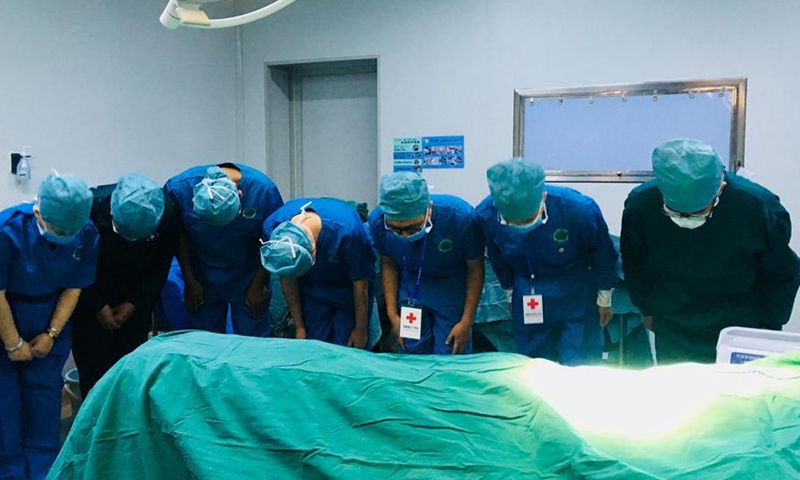Political advisor proposes cross-regional sharing mechanism of organ donation

Medical staff bow to the organ donor Li Hongyan before the organ procurement surgery in Shannan, southwest China's Tibet Autonomous Region, Aug. 22, 2018. File photo: Xinhua
China has more than 140,000 registered people waiting for organ transplants, but the number of organ transplants is less than 20,000 per year. Establishing a cross-regional sharing mechanism of organ donation would better allow the donated organs go to the most needed, a political advisor proposed.
At the annual two sessions, Zhu Tongyu, a member of the CPPCC National Committee and vice dean of Fudan University Shanghai Medical College, pointed out in his proposal that significant progress has been made in organ donation and transplant filed since China has ceased the practice of using organs from executed prisoners starting from January 1, 2015, but there remains a substantial gap between the supply of organs and demand .
According to the latest statistics from the China Organ Transplantation and Sharing System in 2023, the number of registered organ transplant candidates in China has exceeded 140,000, but the number of annual organ transplants is less than 20,000, leaving many patients waiting, with some passing away while waiting, Zhu said.
Millions of end-stage renal failure patients in China are receiving dialysis treatment, with the number of new liver failure patients is ranging from 500,000 to 1 million annually.
Zhu said that organ procurement and distribution are mainly based on provincial boundaries, with organ donations primarily shared within provinces, and cross-provincial organ distribution accounting for a very small portion, a trend that is becoming increasingly apparent.
High-level medical center cities like Beijing and Shanghai have service areas covering the entire country, with a large number of patients in need of transplants coming from all over the country. However, their access to organ transplants remains limited to Beijing and Shanghai, he detailed.
For example, he said that Shanghai could establish a sharing and distribution network with other cities in the Yangtze River Delta region, while Beijing could share organ distribution with the Beijing-Tianjin-Hebei region, aligning with regional planning based on medical service capabilities.
"Establishing a mechanism for regional organ sharing can effectively alleviate the contradiction between organ supply and demand, improve organ transplant efficiency, and save more lives of organ failure patients, ultimately enhancing the health level of the people," Zhu said.
China has established a complete legal and regulatory guarantee system, policy support system, work supervision and quality control system for organ donation and transplant.
National regulations stipulate that organ donation must adhere to the principles of voluntary and unpaid participation, and the conditions and procedures of donation should be improved based on the Civil Code, according to Xinhua News Agency.
Photos
Related Stories
- Chinese scientists develop probe for brain oxygen monitoring
- Influence of nation's research seen on rise
- China develops brain implant enabling patient to control computer cursor movement
- New rules on organ donation, transplant take effect in May
- Construction of China's first domestic medical isotope test reactor starts
- Chinese scientist awarded for groundbreaking work in transplantation, cellular therapy
Copyright © 2024 People's Daily Online. All Rights Reserved.









